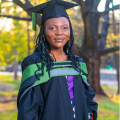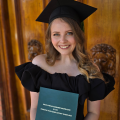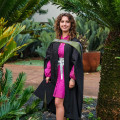2025 In-Person Recipients
For each conference, a small number of Emerging Scholar Awards are given to outstanding graduate students and emerging scholars who have an active research interest in the conference themes. Emerging Scholars perform a critical role in the conference by chairing the parallel sessions, providing technical assistance in the sessions, and presenting their own research papers. The 2025 Emerging Scholar Award Recipients are as follows:

Nadine du Piesanie
University of Pretoria, South Africa
Nadine Du Piesanie is a part-time lecturer in the Department of Consumer and Food Sciences at the University of Pretoria, with expertise in food literacy, engaging Generation Alpha, Consumer behaviour, large-scale food preparation, and product development. She is also a wine connoisseur with extensive experience in event management. Currently pursuing a PhD in Consumer Science, Nadine focuses on using gamification as a tool to engage Generation Alpha towards a more sustainable future through food literacy. Her research incorporates innovative elements such as gaming and eye-tracking technology to address malnutrition and foster autonomy. Her teaching philosophy integrates community engagement and theoretical knowledge with practical application, equipping students to navigate food systems and make informed, sustainable choices. Through her dedication to empowering future generations, Nadine aims to inspire a lifelong love for learning and sustainable practices.

Marina Fourie
University of Pretoria, South Africa
Marina Fourie is a PhD student and emerging food industry consultant with a specialized focus on food marketing. Combining academic rigor with more than 10 years practical industry experience, Marina strives to established herself as a thought leader in understanding consumer behavior, branding strategies, and market trends within the dynamic food sector in South Africa. Passionate about sharing knowledge, Marina enjoys working as a part-time lecturer, inspiring students with her expertise and enthusiasm for the field. She believes in the power of education to transform the foodindustry, fostering innovation and sustainability while bridging the gap between academia and real-world application. When she’s not immersed in research or consulting, Marina enjoys exploring culinary trends, connecting with diverse cultures through food, and mentoring aspiring professionals in the field.

Lilian Kafuko
University of Pretoria, South Africa
Miss Lilian Kafuko is a dedicated and driven doctorate candidate in Food Science at the University of Pretoria, South Africa, with a focus on profiling bioactive peptides in wheat flour fermented with Kluyveromyces marxianus. With a strong academic foundation, holding both a Bachelor’s and Master’s degree in Food Science, Miss Kafuko is deeply committed to advancing food security and eradicating malnutrition across Africa. Their exceptional leadership skills have earned them multiple elected roles, representing student needs and fostering positive change. A Mastercard Foundation Scholar and multiple award recipient, Miss Kafuko combines academic excellence with a passion for sustainable development and community impact.

Rochelle Van Veijeren
University of Pretoria, South Africa
After graduating with a degree in Consumer Science from the University of Pretoria, she pursued a Master’s degree in Consumer Science, focusing on consumer knowledge about South Africa’s Paediatric Food-Based Dietary Guidelines. Currently, she is pursuing a PhD in Consumer Science at the University of Pretoria. Her doctoral research explores the use of projective techniques in consumer research to uncover hidden motives behind grocery purchasing decisions.

Lesego Marule
University of Pretoria, South Africa
Lesego Marule is an accomplished consumer scientist with a wealth of experience in food management across various hospitality industry sectors. She has contributed to the academic domain of hospitality, particularly in the design and development of tertiary-level qualifications and educational resources, serving as a head of a programme at The Independent Institute of Education. Her efforts are centered on applying her industry expertise to create curricula and content that ensure graduates are adequately prepared to meet the industry's evolving demands. As a researcher, Lesego’s work has focused on food safety, particularly, consumer perceptions. She holds a lecturing position at the University of Pretoria, where she is also pursuing a PhD in Food Management, investigating issues of food sustainability and innovative product development.

Charmaigne Sehoole
University of Pretoria, South Africa
Ms Charmaigne Sehoole is an early career researcher and a lecturer in the Department of Consumer and Food Sciences at the University of Pretoria. She holds a master’s degree in Consumer Science: Food Management and is pursuing a PhD in the same field. Her doctoral research focuses on the consumer perception of indigenous pulses, thereby establishing a way to enhance their image and ensure they feature prominently in modern consumer diets. A true foodie at heart, her strong belief is that everyone, regardless of their socio-economic status, deserves access to healthy and nutritious food that meets their taste preferences.

Giulia Damilano
University of Pretoria, South Africa
Giulia Damilano graduated with a Bachelor of Science in Nutritional Sciences from the esteemed University of Pretoria in 2022. She is currently in the second year of her master’s degree, researching the impact of traditional African foods on the gut microbiome. Her work explores how these fiber-rich foods support healthy microbiota. Giulia has a strong interest in the field of genetics where she is working as a nutritional genetics consultant and has expanded her expertise by completing courses in methylation, sport nutrition and hormones. She has a strong interest in the function of micronutrients in the body how they can improve health. In addition to her academic and professional pursuits, she enjoys cycling and sailing the open ocean. She is actively involved with Cycling South Africa, assisting at events and managing their social media content.










